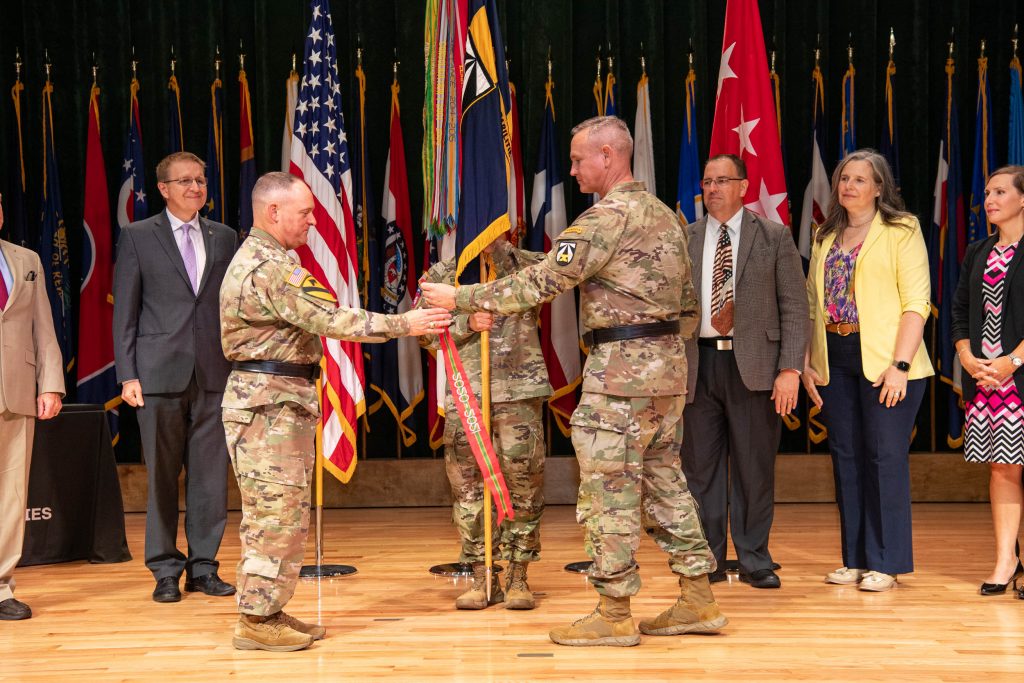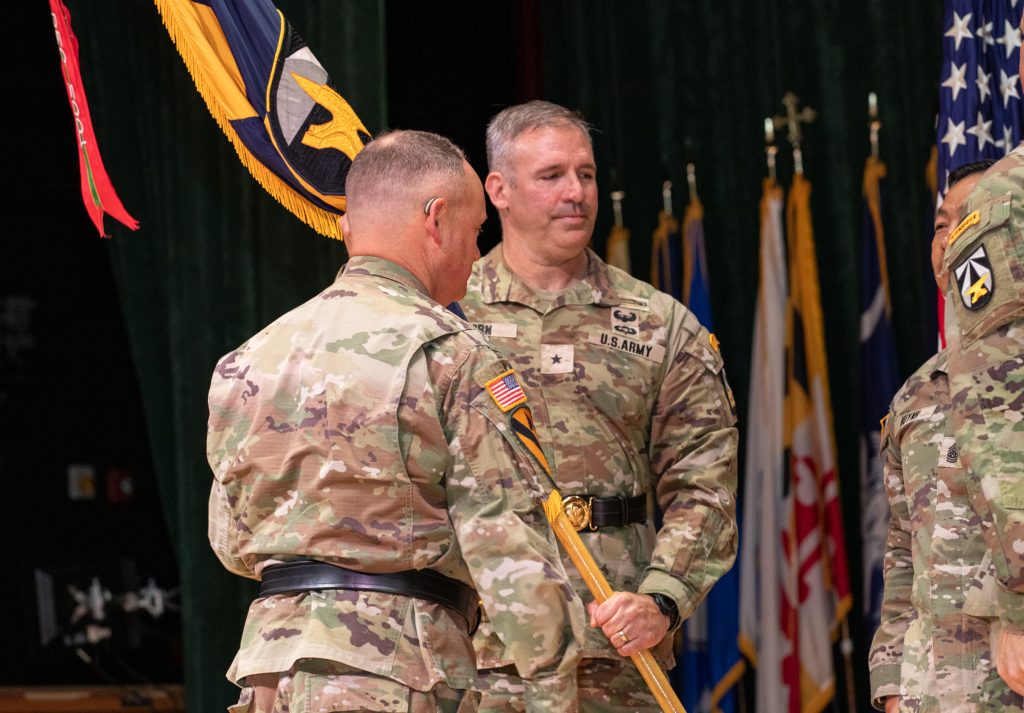Shaping the team, on and off the field
December 1, 2023Ryan Rayno, DEVCOM Headquarters
ABERDEEN PROVING GROUND, Md. – “I do believe that kids mimic what they see,” Rick Burton, U.S. Army Combat Capabilities Development Command, or DEVCOM, explained. “I always saw my mother and my grandmother doing good, and to me, that was just something that was instilled in me at a young age.”
Burton grew up in a family that believed in supporting their community of Walbrook Junction, a neighborhood in West Baltimore, Maryland.
“My mother and grandmother were involved in a lot of church communities inside of Baltimore City, and as they volunteered, they would drag me along with them,” Burton said. “My mother would prep food and make meals for people, and my grandmother would work with church funds to help people pay for groceries or bills.
“Sometimes, if someone couldn’t make it to the store to get the groceries, they would send me, and here’s this six-year-old, walking to the store with a list and picking up groceries,” he further explained, while laughing.
“I do believe that kids mimic what they see,” Rick Burton, U.S. Army Combat Capabilities Development Command, or DEVCOM, explained. “I always saw my mother and my grandmother doing good, and to me, that was just something that was instilled in me at a young age.”
While embracing the fabric of his family’s culture of togetherness, he also embraced the fabric of Maryland’s sport culture: lacrosse.
“I started playing lacrosse in 1993, with three of my closest friends, at William H. Lemmel Middle School in Baltimore,” he said. “I really loved the mental part of the game: everyone’s size and shape can be an advantage and disadvantage, so it’s like chess in that you have to put the right pieces in the right place in order to win.”
Though his playing days may be over today, he is still part of the sport’s community through his coaching and volunteering.
Burton is a coach at Edgewood High School, located approximately 30 miles east of Baltimore, organizes lacrosse clinics in conjunction with USA Lacrosse, the governing body of lacrosse in the U.S., and operates Route 40 Lacrosse, an organization that focuses on bringing the game to young people of all backgrounds.
“I use lacrosse as a conduit to reach the kids; not just to grow the sport in communities,” he explained, “but to teach them to be good people as well.”
Burton believes that the skills needed to be successful in lacrosse directly translate to being successful in life.
“Lacrosse isn’t just brute strength. It requires having an awareness of what’s going on across the field the entire time,” Burton said. “Players need to make quick assessments as they’re running down the field and then make even quicker decisions that can affect the game in a positive way. The same thing can happen in life: sometimes you’re moving at a fast rate, and you need to make fast decisions that affect you and those around you.”
The positive influence that Burton hopes to have on young adults does not end on the lacrosse field, however, as he continually tries to reinforce the importance of smart decisions in the classroom as well.
Burton additionally volunteers his time with two separate school programs that focus on tutoring and mentoring: the Maryland Freestate ChalleNGe Academy at Aberdeen Proving Ground South in Edgewood, Maryland, and the Pathways in Technology, or P-Tech, program at Joppatowne High School in Joppatowne, Maryland.
“At the challenge academy, I tutor the students in math and science for an hour, but really, the last thirty minutes we take the time to close the books and talk,” Burton said. “I think they realize that even though I’m in a suit, I’m from a neighborhood that had me in situations that were not too different from theirs, and I’m not going to talk down to them.”
The academy is one of a nationwide network of tuition-free programs that offers at-risk adolescents catered instruction to prepare them to take the General Education Development exam.
“What I try to tell them is that it’s all about the decisions and choices that they make,” Burton explained. “I want them to understand that when you’re emotional and not understanding how that can affect you, you can make a decision that could cost you the rest of your life.
“I make it very clear with them: I come from a part of Baltimore that is pretty bad, and I have nieces and nephews from the same environment. They made mistakes that led them down a path that will be very hard to recover from, if they can at all.”
“What I try to tell them is that it’s all about the decisions and choices that they make,” Burton explained. “I want them to understand that when you’re emotional and not understanding how that can affect you, you can make a decision that could cost you the rest of your life.”
From tutoring school subjects in one classroom to career guidance in another, Burton seemingly does it all.
“When I saw the big picture of what P-Tech was doing to get kids into the IT field, and I saw the program being placed at Joppatowne High School, I knew I had to be a part of it,” Burton said.
P-Tech is a public education reform model focused on college attainment and career readiness that enables students to gain academic and professional skills required to either continue their education in a four-year institution, or enter entry-level careers in IT, healthcare, advanced manufacturing and other fields.
“I think it’s brilliant to give students the exposure to the IT field now, rather than at college,” Burton said. “I think it’s brilliant that the program gives students the exposure to something that is not available to all of the high schools in Harford County.”
As a patent security specialist for DEVCOM, Burton has been able to use his experience and knowledge in the IT field to directly shape that early exposure that his students receive.
“Being a part of the Third-Party Patent Review Program, my team and I analyze submissions routed through the U.S. Patent and Trademark Office and determine if the patent applications under review possess technical capabilities that negatively impact mission effectiveness of any laboratory effort or military intelligence for the U.S. Army,” he said. “We analyze their programming applicability, software processes … those sorts of things, and whether these submissions will either help or hurt the U.S. Army’s modernization priorities.
“Data analysis, programming, cybersecurity; these are the skills necessary to be successful on our team, and those same skills are what I’m teaching to the students at P-Tech. I also want them to understand that they don’t necessarily have to attain a college degree to do this, they can earn certifications within the IT field that will open so many opportunities to be successful without the massive debt.”
Aside from teaching the skills necessary to be successful in an IT position, Burton also provides guidance on things that may not always be on the mind of his students.
“We also talk about financial aid,” he said. “I wish someone had talked to me about where scholarships are, and what kinds of financial aid could put me in jeopardy.
“Beyond that, we talk about the stressors of balancing education, work and life at the same time.”
While Burton has helped many students and athletes learn from his successes, he has learned from them at the same time.
“What I’ve learned the most from the kids,” Burton explains, “is that everyone communicates differently, everyone learns differently and everyone processes information differently. So as a leader, I have become much better at communicating with my team in that regards, and I’ve learned how to be better at building a positive team dynamic and culture.
“Now, the standard is the standard, but how we get to accomplishing our mission will always be different for each member of the team.”
According to Charles Ganiel, Burton’s supervisor, that positive team culture is easily noticeable.
“Rick is such a down-to-earth person and has such a positive outlook on life,” Ganiel said. “He definitely lights up the room when he walks in, and everyone knows he is present. “He mentors many Maryland youth by stressing teamwork, and this philosophy plays an important role in his day-to-day interaction here with his teammates. He is always there to help and offer what he has learned throughout his government and personal experiences when challenging taskings or new requirements are given to the division.”
“Rick is such a down-to-earth person and has such a positive outlook on life,” Ganiel said. “He definitely lights up the room when he walks in, and everyone knows he is present.”
Whether it’s coaching with lacrosse, mentorship through the P-Tech, tutoring at the challenge academy or working at DEVCOM, Burton tries to impact those around him in ways he hopes reach far beyond four end lines or four walls.
“At the end of the day, I want to help people like my mom and grandmother did,” Burton said. “I want to be a positive influence at all times.”
—
The U.S. Army Combat Capabilities Development Command, known as DEVCOM, is home to thousands of Army scientists, engineers, technicians and analysts working around the globe to leverage cutting-edge technologies and empower the American warfighter with the data and abilities to see, sense, make decisions and act faster than our adversaries – today and in the future.
As part of Army Futures Command, DEVCOM takes calculated risks to find new technological solutions each day. Our experts drive innovation, improve existing technologies and engineer solutions to technical challenges. Our work goes beyond theory to simulation and prototyping. We take potential science and technology solutions from the lab “into the dirt” for experimentation alongside Army Soldiers. DEVCOM prides itself as a global ecosystem of innovators, from world-class universities and large defense contractors, to small, minority-owned businesses and international allies and partners.








